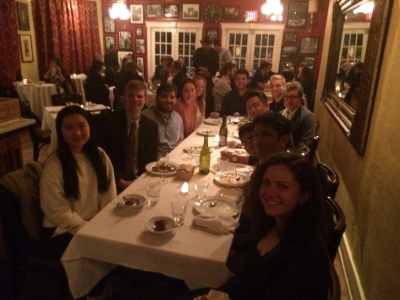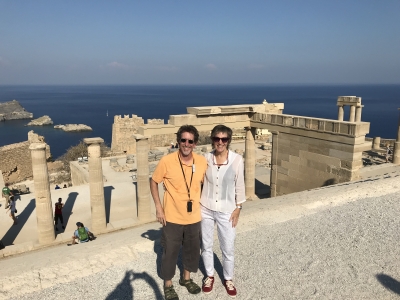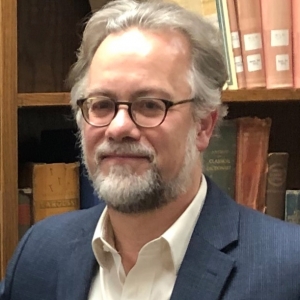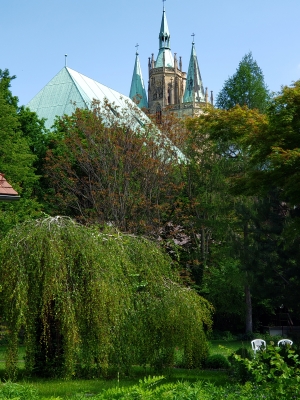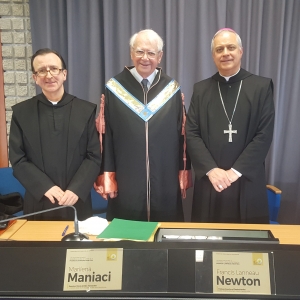Carla Antonaccio
"My first full year of retirement is nearing its end (I will forever be thinking that the year starts in the fall and ends at Memorial Day). It has been a great satisfaction to see three PhD dissertations to their final defenses: Tim Shea (co-directed with Sheila Dillon of Art, Art History and Visual Studies), Emma Buckingham (a Carolina student, co-directed with Donald Haggis at Carolina) and Cicek Beeby (ditto). Two more to go. Otherwise much of my time has been devoted to finishing various articles and chapters for publication: three completed, and three more in various stages of writing and editing. Lastly, with my colleague Jane Carter (emerita at Tulane and currently Editor in Chief of the American Journal of Archaeology) I will be sending off the copy-edited manuscript of the Cambridge Companion to the Greek Iron Age this summer.
"I continue to be involved in the affairs of the Archaeological Institute of America (chairing the Nominating Committee after rotating off Governance) and serve as Archaeology Delegate for Oxford University Press. There is a steady stream of invitations to review books, grant proposals and manuscripts to pick and choose from. In the fall, I will be leading a trip to Sicily and Malta, leading a tour for the Archaeological Institute."
Jed Atkins
"The past academic year was an especially busy and fulfilling one. In the Fall, I directed the Visions of Freedom Focus cluster. Focus is a selective first-year program, in which students live together, take common courses, and interact with faculty and guest speakers outside of class over meals. I’ve taught in Focus for the past four years and find it to be a highlight of my teaching experience at Duke. This was my first year directing our cluster, and I enjoyed working to help create an intellectual community for our first-semester students. Once again a highlight of our cluster was the weekend field trip to Washington, DC to see the National Archives, tour the Capitol building, and visit the National Museum of American History. Unfortunately, this year our tour of the National Mall was rained out, though Ed Fleming, the head ranger of the Mall, kindly agreed to guide our tour through the American History museum instead.
"Another highlight of my teaching experience at Duke is my “Democracy: Ancient and Modern” course, which students describe as “a 90-student focus course.” I taught the course yet again this spring. Once again students enjoyed comparing Athenian and American democracies across a range of themes, from liberty and equality to civil religion and “democratic hope.” Lectures were supplemented by break-out discussion sessions in which students explored questions such as “Is American democracy more immune from despotism and tyranny than Athenian democracy?” Students also heard from a line-up of guest speakers, including leading classicists, political theorists, and policy experts. Once again, students were able to enjoy meals with these guests: lunches were held at the Divinity School Café and dinners at Vin Rouge. I frequently hear from my students that this course represents a unique and rich educational opportunity, which motivates me to continue to offer it. I am grateful for those who allow me to offer it in its current format: the Classical Studies department, the Paletz Innovative Teaching Funds, and the Dean of Arts and Sciences, Valerie Ashby, all provided funding. The course is very much a team production, and I would like to thank my TAs, Hannah Ridge, Alex Karsten, and Makaila Christensen for their wonderful work.
"On the research side, this year was a transitional one as I guided towards publication several papers on topics related to Greek and Roman political thought (with a paper on integrity and conscience in medical ethics mixed in for fun). Now I’ll be turning my attention fully to my next book: The Christian Origins of Toleration. A graduate course on toleration in the history of political thought from Rome to present helped me refine my thinking on the topic. I learned a lot from a great group of students from classics, history, divinity, and political science. I’ll be on sabbatical this coming academic year writing a first-draft of the manuscript."
Mary T. Boatwright
"It’s been fun to return to teaching in 2018-19 after spending my 2017-18 sabbatical writing Imperial Women of Rome: Power, Gender, Context; teaching was especially fun once my manuscript went to Oxford UP in March ‘19. In F18 I taught my Roman topography graduate seminar to eight great students; their two team projects covered Adrastus’ house built near the Column of Marcus Aurelius in central Rome, and the Severan ludi Saeculares of 204. My other course, my beloved 3rd-semester Latin, was equally rewarding because of my excellent students. In S19 my Roman History course, taught to 21 lively undergrads, was assisted by our grad student Antonio LoPiano. My Latin course on historiography and biography, for which we read Tacitus and Suetonius on Nero, enrolled an intrepid group who learned a lot of Latin and perhaps too much about Nero. I also led an independent study that included other “Neronian” Latin such as the Apocolocyntosis and Lucan’s Pharsalia. All of this is good prep for my next book, a biography of Agrippina the Younger, and has whetted my appetite. First, however, I must complete all the appendices, maps, illustrations, and other untidy parts of Imperial Women of Rome that I can turn to once I hear readers’ reports.
"Other highlights: From August into February I mentored Michael Steed, a senior from the North Carolina School of Science and Math, in a project on imperial Roman history, biography and epigraphy. This was particularly gratifying, especially since Michael had no Latin; his fearless curiosity and STEM-driven questions had me think in new ways. In October 2018 I joined a Duke Alumni trip to the Aegean, encountering marvelous Delos for the first time (of many, I hope) and thoroughly enjoying Athens, Rhodes and other places I had not seen in decades. And the company was fabulous! In January 2019 I assumed a one-year presidency of the Society for Classical Studies, a rewarding position that keeps me agile. In May my “Model Families in Imperial Rome and Palmyra” was published in Women, Children and the Family in Palmyra (ed. S. Krag and R. Raja). I’m looking forward to summer: tentative plans include a visit to Hadrian’s Wall and to Rome, and certain ones focus more on my books. And it would be a pleasure to see any and all of you!"
Rex Crews
"This year I taught a new course (Latin 251) in review Latin that I had developed over the previous semester and summer. This course incorporates a review of Latin grammar and translation techniques within the larger context of the reception, alteration and adaptation of Latin authors in 18th-20th century Latin readers. A brave group, comprised mostly of freshmen, read and discussed Livy, Eutropius and Ovid as presented in these readers by way of review and then re-read unaltered and expanded selections from the same authors, accompanied by much discussion regarding to what extent and to what end both the Latin and the message of the Roman authors had been altered in the readers. I thoroughly enjoyed teaching the class, and students went on to do well in 300-level courses in the spring. I am also happy to report, in my capacity as supervisor for elementary Latin instruction, that our beginning Latin enrollment was up by almost a third this year after departmental promotions of our Latin program to incoming freshmen. Along with the graduate instructors, I look forward to nurturing another group of Latinists in fall!"
Gregson Davis
"Last academic year saw the publication of my essay in the multi-volume Encyclopedia of Surrealism on the Martinican poet, Aimé Césaire, whose lyric masterpiece, Journal of a Homecoming (Cahier d’un retour au pays natal) was famously lauded by the leading light of the surrealist movement, André Breton, as “the greatest lyric monument of our time.”
"The highpoint of my year, however, from both an academic and social point of view, was an invited talk I was privileged to deliver in St. Lucia as part of the celebration of that island’s annual Nobel Laureate Week. On this festive occasion, I enjoyed giving a lecture to a non-academic audience on the last published volume of poetry by the late Derek Walcott (one of two Nobel laureates native to the island of St. Lucia), which he entitled, White Egrets. The precious experience of sharing my thoughts on the poetry of this great Caribbean verbal artist with his proud compatriots was as uplifting as observing the flight of those iconic birds during their seasonal migration to the shorelines of the Antilles."
Maurizio Forte
"I will continue the archaeological excavation in the Etruscan and Roman site of Vulci (10th cent. BCE, 5th cent. CE), in Italy (the Vulci 3000 Project), with an international team involving undergrad, grad students and faculty from US and EU (sponsored by Duke Bass Connections, A&S grant and Fondazione Rovati). In the summer 2019 the research project will be extended also to the UNESCO sites of Cerveteri and Tarquinia with the creation of new 3D digital and multispectral maps of the landscape by drones, 360 VR cameras and rover-robots.
"In Vulci we will start the fourth year of excavation in the area of the Roman Forum. We expect outstanding results from the exploration of an Etruscan well and cistern and several Etruscan and Roman buildings.
"The concentration of these and other water infrastructures (in and off site) is mainly located close to the area of the Big Temple and not far from the Roman West Gate: this would suggest the pre-existence of ritual activities in relation to the use of public water.
"The Etruscans are known for their advanced hydraulic engineering, as seen by their extensive well systems connected through underground aqueducts and tunnels as well as sewerage drainage systems using slopes. Vulci, one of the major cities in Southern Etruria and an economic powerhouse, would have had a large water management system spanning throughout the city. Vulci managed and controlled water and sewerage in the city. Water access is a crucial aspect of social relations as well as ancient urban planning.
"The documentation of the archaeological excavation will be completely 3D and paperless; this will allow a Web-GIS open access of all the data and models. The combined use of drones, high-res cameras, laser scanners and digital photo grammetry will be able to produce very detailed data and maps.
"The project will host for the second year the IFR international fieldwork school for American undergrad students which will work with the Duke team for five weeks."
José M. González
This summer I will becoming off my duties as Director of Undergraduate Studies. These last three years it has been my privilege to oversee and improve our undergraduate program. I have especially enjoyed advising our majors and I am delighted that their numbers have increased under my tenure. They are certainly among Duke’s very best—extremely bright, curious about the world, highly motivated, and extraordinarily accomplished. Academic excellence in Classical Studies calls for an exacting combination of close analysis and creative synthesis. We are fortunate to attract outstanding students who shine at the challenges of our interdisciplinary field.
This spring saw the publication in Phronesis of a substantial article on mimesis in Aristotle’s Poetics. This particular study has enjoyed a long period of maturation and offers fresh insights into Aristotelian universals, particulars, and the process of induction. Pedagogically, the highlight of the year was a new course on “Self-knowledge and the Pursuit of Wisdom” that I taught in the fall. I had envisioned this course for first-year students. In the event, most of the students were seniors. The experience is hard to put into words. I had never before seen so great a degree of personal disclosure and individual risk-taking in a class setting. Students engaged vigorously with Plato, Aristotle, Augustine, and recent work on the benefits and challenges of self-knowledge. Our exploration of “self” and “wisdom” was intensely practical. As seniors about to step into the “real world”, the young men and women who took the class were eager to reflect on their four years at Duke and to challenge each other around questions of personal meaning and significance. I was honored to facilitate their discussion and encourage their exploration. The best way to encapsulate the experience is to say that I made lifelong friends with whom I look forward to staying in touch for years to come.
Kyle Jazwa
"It was another wonderful year at Duke. I had the privilege to teach several courses in Classical Studies and Greek Archaeology. The students continued to impress with their creativity and enthusiasm, especially with their hands-on, final research projects. The “Ancient Science and Technology” students again hosted an Ancient Science Fair where they displayed more than two dozen reconstructions of Greek, Roman, Egyptian, ancient Korean, and Native American technologies, including functioning catapults, Roman medical tools, a shaduf, and Egyptian make-ups and perfumes. In April, the “Ancient Athletics” students put on a successful class Olympics competition in Duke’s Field Hockey stadium. There were opening/closing processions, (bloodless) sacrifices, musicians, trainers, and, of course, the track and field events.
"This past year has also been quite productive for my research. I wrote and presented several papers on ancient architecture, technology, and settlement ecology. I also co-organized two paper sessions at the AIA Annual Meeting in San Diego on the topic of Human Adaptations in Mediterranean Environments. These sessions brought together archaeologists working in Mediterranean regions throughout the world – especially southern California, South Africa, and the Mediterranean basin – to compare subsistence, settlement, and storage strategies in the shared Mediterranean environment. My collaborator and I are now preparing an edited volume on this theme.
"Taking inspiration from the Ancient Science and Technology students, I also began a research project with a trained potter and archaeologist from the University of Amsterdam to recreate the world’s earliest ceramic roofing tiles. In doing so, we hope to explore processes of cross-craft interaction (ceramics and architecture) and invention in Greek pre- and proto-history. Plus, we have an excuse to have fun with clay! My current book project also touches those topics and will be the first publication of a complete assemblage of Early Bronze Age ceramic roofing tiles, the tiles from Zygouries (near Corinth) that were excavated almost 100 years ago.
"I am looking forward to this summer’s fieldwork and research. After a brief archaeological survey on the Channel Islands of southern California, I will travel to Greece to study architectural material in Attica, Boeotia, and Thessaly. Some of my time will also be spent in the libraries at the American School of Classical Studies at Athens."
Alicia Jiménez
"After working on my second book project on the archaeology of mimesis during my junior sabbatical in 2017-2018, I received a Book Manuscript Workshop Award by the Franklin Humanities Institute at Duke. Thanks to the program, I had the incredible opportunity to discuss the manuscript and receive feedback from Profs. Jennifer Trimble (Stanford University), Harriet Flower (Princeton University), Carl Knappett (University of Toronto), Jennifer Gates-Foster (UNC Chapel Hill), Sheila Dillon (Duke University), David Morgan (Duke University), Maurizio Forte (Duke University) and Mary Boatwright (Duke University).
"I returned to the field in the winter of 2018, to create a new LiDAR-based map to study the walls and internal layout of the Roman camps near Numantia (Renieblas, Spain). This remote sensing method employs light pulses of near-infrared laser to measure ranges (variable distances) to the Earth’s surface from a drone. It allows producing highly precise, three-dimensional models of the surface of a site eliminating some of the elements that block the view in traditional aerial photography, such as vegetation.
"The only plan of all the camps available at the moment is the one drawn for A. Schulten by German topographers at the beginning of the 20th c. The plan of Renieblas Camp III, in particular, has been repeatedly reproduced in scholarly publications since the 1930s to illustrate the typical Roman camp of the 2nd c. BCE as described in Polybius’ book 6. The new orthographic map and digital reconstructions of the five overlapping camps have the potential to offer a more accurate representation of the Roman structures and provide archaeologists with precious data about the internal layout of Roman encampments during the first phase of Roman expansion outside the Italian peninsula.
"The LiDAR map has been funded by the Provincial Government of Soria (Diputación de Soria, Spain). I was recently awarded two further generous grants from the Gerda Henkel Stiftung (Germany) and Duke’s Arts & Sciences Council to go back to the field with my team this summer and complete the field survey using terrestrial scanners in selected areas of the site. In the spring I prepared a proposal for a colloquium session on Roman camps for inclusion in the academic program of the next Annual Meeting of the Archaeological Institute of America (Washington, D.C. January 2020) that has been accepted. I am thrilled to have been offered the chance to present the results of Duke’s project at Renieblas at Washington and discuss, with distinguished European archaeologists who have excavated in important Roman military settlements, the evolution from the earliest republican camps documented archaeologically in the west (Trieste, Numantia, Alésia), to imperial military enclaves (German-Raetian limes, Vindolanda).
"This year I have also developed a new survey course on Roman archaeology (CLST 551s) and completed the cataloguing or Roman coins at the Nasher Museum as part of the hands-on activities with students taking the seminar Roman Coinage: The Materiality of the Roman Economy (CLST 540s).
"In addition, I gave a paper at the Theoretical Archaeology Group conference at the University of Syracuse, NY (May 2019) addressing questions of replication and invisibility of female bodies, using ancient Roman honorific statues as a case study. Finally, the academic year ended with the publication of my contribution to the Cultural History of Money in Antiquity, edited by S. Krmnicek."
William Johnson
As I write this (June 2019) I have just returned from an extraordinarily stimulating conference on the "Dead Seas Scrolls and Ancient Media Culture" in London, in which I offered a viewpoint from the Classicist's realm as a specialist on bookrolls and readers and reading in Greco-Roman contexts. Along similar lines, I am pleased to report that my Readers and Reading Culture book (OUP 2010), along with other aspects of my work, has an entry in the Dictionary of the Bible and Ancient Media, published by Bloomsbury in 2017; and that the two panels organized in Fall 2016 and 2017 at the Society of Biblical Literature (“Reading Cultures of Judaism and Christianity: A Dialogue with William A. Johnson”) are now the basis for a set of manuscript workshops we will be hosting at Duke in Fall 2019, and St Mary's University London in Spring 2020. That edited volume will contain contributions from scholars in Judaic Studies, New Testament Studies, Early Christianity, and Classics.
My teaching highlight this year was Papyrology, a course I have deliberately designed so as to be able to welcome both advanced Classics grads and graduate students in other departments whose command of Greek is not as firm. We start off at my house, learning how to write properly on papyrus and to apply wax and write on wooden tablet replicas that I have made. Overall, the first half of the class is a boot camp, as it were, in which I set as riddling examples papyrological artefacts for the students to study and figure out, taken both from items in our papyrological collection in the Rubenstein, and from other collections where I have worked (esp. Oxford and Yale). This involves two papers per week that I work through meticulously and critique. It is exhausting for both students and professor, but by the end of this phase of the course the students have the basic knowledge they need to approach this extremely challenging discipline. The second half of the course is taught by the students, but with lots of elbow-to-elbow work to be sure they command the materials they present. This is the most demanding course I teach at Duke, both because it requires a very high level of expertise and experience that needs to be constantly refreshed, and because I teach it in such a hands-on fashion. The nine students this Fall, ranging from a NT divinity student to quite advanced Classics students, are about as many as such a course can bear.
You'll find more about my various professional activities at profwilliamjohnson.com
Laura Lieber
"In the last year, I spent a lot of time working on translation projects. My book, Jewish Aramaic Poetry from Late Antiquity: Translations and Commentary (Brill) came out in 2018, and another volume, Classical Samaritan Poetry, is well under way. These two projects are important because they are helping to make these bodies of literature available to a more general scholarly readership—particularly people in Religious Studies, Classical Studies, and Comparative Literature. But they are also important because they are the basis for my current research on religion and theatricality in Late Antiquity (roughly the third through seventh centuries CE). I also had two articles come out: “With One Voice: Elements of Acclamation in Early Jewish Liturgical Poetry” (Harvard Theological Review); and “Daru in the Winehouse: Dancing and Performance in the Jewish East in Late Antiquity” (Journal of Religion). This last piece is a personal favorite, and my first foray into the Persian-Jewish antiquity.
"As part of my work on religion and theatricality, I had the opportunity to attend a variety of conferences. Last summer, I presented at the International Organisation of Targum Studies meeting in London and the European Association for Jewish Studies meeting in Krakow (Poland). And currently (May-June 2019), I’m a Fellow at the Research Centre for the Dynamics of Jewish Ritual Practices in Pluralistic Contexts from Antiquity to the Present at the University of Erfurt in Germany. In July, I’ll be in Leuven (Belgium) where I’ll be presenting at the Medieval Hebrew Poetry Colloquium.
"I’m excited to be teaching a course on Religion and Violence in the Fall, and in the Spring I’ll be teaching a graduate course on Rabbinic Judaism—that is, Jewish texts and traditions from Late Antiquity. Last Fall, I taught Aramaic for the first time at Duke, and I hope to offer that course again, too.
"Of course, one of the best things to happen to me in 2018-19 was receiving a secondary appointment in Classical Studies. My research and teaching focus on Jews and Judaism in antiquity, and my first professional position at Middlebury College was jointly in Religion and Classics, so formally affiliating with Classics at Duke seems more than sensible—it’s a natural! I’m delighted to be a part of the Classical Studies community."
Francis Newton
"On November 1, 2018, at a conference on recent research in Mediaeval Medicine held at Duke (Michael McVaugh (UNC) and Malachi Hacohen (Duke) as convenors) I presented, with Eliza Glaze of Coastal Carolina University, a report on the coming of Arabic medicine to Europe in the last quarter of the 11th century. On April 5 this spring, at a ceremony at the Università di Cassino e del Lazio Meridionale, the Rector of that University conferred on me the degree “Laurea Magistrale Honoris Causa in Lettere.” Among the speakers were professors of the University, the Abbot of Montecassino, Revererendissimo Donato Olgiari, and the abbey’s archivist, Don Mariano Dell’Omo. Fourteen members of my family were on hand. I gave a brief lecture on “Th Golden Age [the 11th Century] of Manuscript Culture at Montecassino.”"
Clare Woods
"This has been my third busy year as Director of the Thompson Writing Program. In the course of it, we expanded into Bivins Building on East Campus, and opened a Graduate Writing Lab as part of the Writing Studio. Story Lab, which I co-direct with Eileen Chow and Carlos Rojas (both from AMES), took on a new life partnering with the Humanities Unbounded Games and Culture Lab in a new space in the Link. The Lab had a "soft opening" in that space in Spring 2019, and will get fully underway again this coming Fall. In terms of research projects, my digital project - Carolingian Intellectual Networks - continues to grow. I presented a talk ("Travels with Texts: Mapping Exegesis in Early Medieval Europe") at the Society of Biblical Literature annual meeting in Denver in November, and another, "Mapping Exegesis: Networks of Scholars and Readers in the Carolingian World" at December's The Connected Past conference in Oxford. I'll give a paper on it again in a joint AIA/SCS panel in D.C. in January 2020. A new project working on annotated early printed copies of Pliny the Elder's Natural History is now well underway with an article in progress. I gave a preliminary paper on this ("In the Margins: Humanist Scholars on Pliny in Print") at the Society for Classical Studies meeting in January 2019. I teach only two courses per year due to my directorship of the Thompson Writing Program. This past year, I developed a new Writing 101 course Travelers' Tales: The Lure of the Mediterranean, which developed student writing through analysis and discussion of travel texts from Homer to the Grand Tour. I also had the pleasure of teaching History of the Book again this Spring. As in the past, we met in the Rubenstein Library's classroom, allowing us to handle rare books and materials in nearly every class. This time around, graduate student Michael Freeman - recipient of a new Archival Expeditions Fellowship - did a stellar job in developing a papyrus/papyrology module for the course. It was also a real delight to supervise a thesis with graduating senior, Elizabeth Needham, on a botanical topic ("Nondum laurus erat: Plants and Empire in Ovid's Metamorphoses.")"

